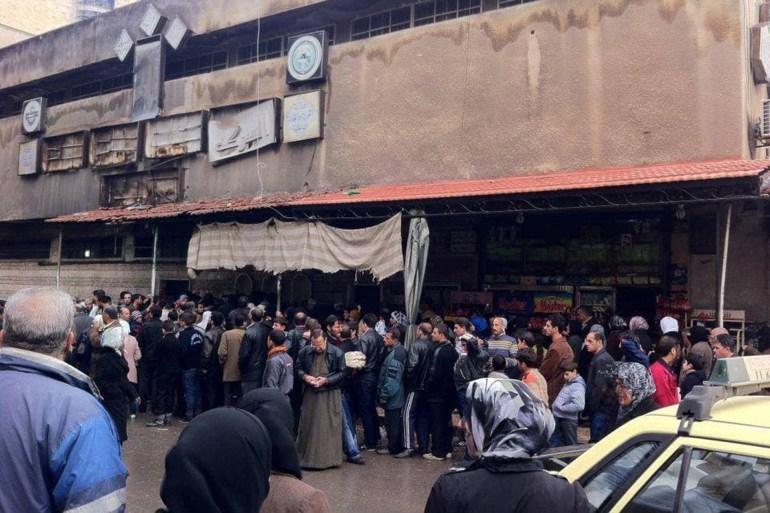In front of the Al-Haram Money Transfer Company in Aleppo city, dozens of Syrians stand in a long queue waiting to receive the remittances of their relatives in countries of expatriate, in a scene that has become commonplace in the areas controlled by the Syrian regime.
With the advent of the blessed month of Ramadan, the burden of civilians increased due to the rise in prices and the continued deterioration of the value of the Turkish lira, at a time when Syria is witnessing an unprecedented economic crisis that the Syrian regime is pushing back to the blockade and foreign conspiracies.
Moataz Al-Halabi (a pseudonym) is one of the regulars in the long queue of remittances waiting for his turn to obtain a sum of money that was sent by his expatriate son in Germany in order to secure the expenses of the expensive month of Ramadan and Eid al-Fitr.
Al-Halabi said in an interview with Al-Jazeera Net that he and dozens of Syrians in Aleppo live on remittances from expatriates, which he describes as their last resource, amid rising prices that have multiplied with the days of Ramadan, especially meat, oils, eggs and vegetables.
The man in his fifties confirmed that he had not tasted the taste of meat for months, as he became the monopoly of the rich after the price of a kilogram of lamb reached more than 25 thousand Syrian pounds (approximately 10 dollars), which is approximately a quarter of the salary of a government employee.
Improvement and sluggishness
Despite the slight improvement in the price of the Syrian pound against the US dollar recently, market prices have not witnessed a significant decrease, especially for basic foodstuffs, according to what citizens in the regime-controlled areas have confirmed to Al-Jazeera Net.
Many residents indicated that the main city markets, such as Jumaila and Bab Jenin, are witnessing stagnation and a lack of buying and selling movement except in order to buy the necessary vegetables to prepare the Ramadan table, as the gap between income and prices continues to grow.
This is due - according to the residents - to the fact that there is almost no control over the city’s markets, and sellers are not obligated to publicly price foodstuffs.
High prices pushed people to refrain from buying and limit themselves to the necessities for the Ramadan table (Al-Jazeera)
The effect of the lira
On the other side of Syria, the markets of the areas controlled by the Syrian opposition are not looking the best, at a time when these areas in northwestern Syria do not witness crises and the loss of basic foodstuffs such as bread, sugar and oil.
Despite the abundance of goods and goods in the market, the high prices doubled in the month of Ramadan, and the buying and selling process has decreased significantly, compared to the previous months of Ramadan in the areas of the Syrian opposition.
Abu Muhammad Benshi, a resident of Idlib, described prices as "imaginary," noting that the exchange of the Syrian currency for Turkish had a great impact on the rise in prices, as at the time of the Syrian pound, people used to accept prices to some extent.
Benche - who is a daily wage worker - told Al Jazeera Net that he gets 20 Turkish liras per day for his work, and in return, the price of one kilogram of tomatoes and another of cucumbers is more than half his wages.
Benche notes that his condition is the case of thousands of Syrians who are now living on their daily food, without being able to secure any additional expenses related to medicine or buy clothes and home supplies.
The scene of queues in front of bread bakeries has become commonplace in areas controlled by the Syrian regime (social networking sites)
Food crisis
And recent United Nations statistics indicate that nearly 60% of Syrians do not receive food regularly, speaking of a new plan that is being worked on to deliver aid.
According to the United Nations Emergency Relief Coordinator Mark Lowcock, about 12.4 million Syrians do not regularly get enough safe food, adding that about 4.5 million additional people have joined Syrians who are unable to obtain food regularly during the past year.
Lowcock describes this increase as "not surprising because the fragile Syrian economy has suffered from multiple shocks during the past 18 months, such as the significant decline in the value of the Syrian Pound."

